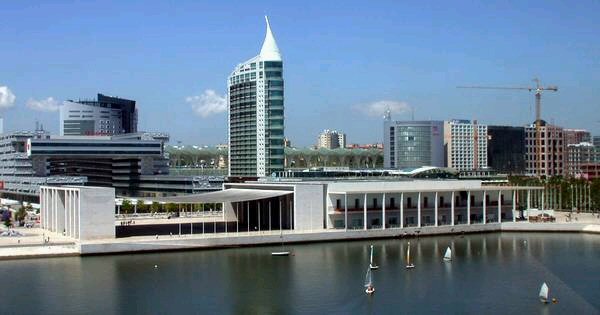

Nations park from Wikpedia encyclopedia |
Service Assurance with Partial and Intermittent Resources SAPIR 2005 Week of July 17, 2005 - Lisbon, Portugal |
| Call for Papers |
1. Papers:
Topics:
Pi-resources in ad-hoc, sensor, and overlay networks
Degradable-power in sensor networks, Dynamic reconfiguration in ad-hoc networks, Dynamic mapping with overlay networksService level agreement for pi-resource behaviors
QoS violation for pi-services, SLA models for pi-services, Service dependency in pi-resources oriented networksDiscovery mechanisms for pi-resources
Discovery models for pi-resources, Physical discovery using smart pi-antenna models, Adaptive time-out discovery protocolsAdmission control to pi-resources
Selection of admission control mechanisms, Prioritization of network traffic, Bandwidth managementHybrid sequential and parallel processing in pi-resources-based systems
Application scheduling, Optimal resource allocationTraffic analysis under sporadic data transfer within systems with pi-resources
Traffic metrics in delay tolerant networks, P2P traffic analysis, GRID traffic analysis, Traffic in weather forecast and medical applications, Traffic management & shaping & engineeringSemantic of high availability for pi-resources
Static versus dynamic availability, Mechanisms to measure and rank availabilityCo-operative and adaptive applications to pi-resources
P2P applications, Self-adaptable applications, Mobile applications, Dynamic peer-adaptability among interacting pi-entitiesContext-aware pi-resources
Context self-adaptable pi-resources, Location-aware applications, Pervasive context-aware systems, Context broker architectures, Semantic Web ontology, Context-aware reuse of learning pi-resources, Context-awareness in ad-hoc networks, Frameworks supporting context-aware pi-applicationsSecurity for pi-resources
Authentication, Authorization, Security profiles, Temporary trustUser behavioral models for pi-resources
User adaptable behavior (user irritation/satisfaction, credits/penalties), Network adaptable behavior to user changes, Human in the management loop (user proactive/ reactive actions)Implications on current communication protocols and middleware
Routing in pi-resource based networks, Bandwidth allocation and controlDesign of network pi-devices and pi-networks
Requirements of pi-resource-based systems, Guidelines to design pi-resource-based systems, Methodologies for pi-resource design, Methodologies for pi-resource-based systemsFrameworks and architectures considering pi-resources
Grid shared resources, Enhanced stand-by mechanisms for pi-resources, Self-adaptation middleware, Agent-based pi-systems, Cluster networks, Web-pi-servicesAdaptive service assurance management
Capacity planning under pi-resources, Decision adoption on pi-resource-based systems, Self-stabilizing pi-resource-based systemsAutonomic computing, on-demand networks, utility computing
Autonomic computing with pi-resources, On-demand pi-resources, Utility computing mechanismsWireless and mobile networks
WiFi, WiMax, WideBand, UWB, ZigBee, MBWA, PAN/LAN/MAN/WAN wireless, Mobility management / Mobile IP, Wireless Multimedia ServicesManagement of intermittent resources, including accounting fault/alarm processing, performance evaluation, metering
Robust adaptive deployment of pi-systems, Service rating and billing, Self-detection, self-isolation, and self-healing with pi-resources, Metering and performance evaluation in pi-resource-based systems, Fault identification in systems with pi-resources---------------------------------------
(*): PI-resources stands for Partial and Intermittent resources
2. Technical marketing/business/positioning presentations:
The conference initiates a series of business, technical marketing, and positioning presentations on the same topics. Speakers must submit a 10-12 slide deck presentations with substantial notes accompanying the slides, in the .ppt format (.pdf-ed). The slide deck will be published in the conference’s CD collection, together with the regular papers. Please send your presentations to petre@iaria.org.
3. Tutorials:
Tutorials provide overviews of current high interest topics. Proposals can be half or full day tutorials. Please send your proposals to neuman@ufc.br, kabacins@et.put.poznan.pl, lorenz@ieee.org, and petre@iaria.org
4. Panels:
Proposals on controversial and challenging topics are expected.
Important dates:
| Submission due | March 1, 2005 |
| Submission for tutorial/panel proposals | April 20, 2005 |
| Notification of acceptance | March 30, 2005 |
| Camera-ready manuscript | April 20, 2005 |
| Conference | Week of July 17, 2005 |
Instructions for papers:
-
The SAPIR 2005 Proceedings will be published by IEEE Computer Society.
-
Best papers will be forwarded for consideration in a special issue of a journal.
-
A best paper award will be granted by the IARIA award selection committee.
-
Only .pdf or .doc files will be accepted for paper submission. All received papers will be acknowledged.
Final author manuscripts will be 8.5" x 11" (two columns IEEE format), not exceeding 6 pages; max 2 extra pages allowed at additional cost. The formatting instructions can be found on the Instructions page.
Once you receive the notification of paper acceptance, you will be provided an online author kit with all the steps an author needs to follow to submit the final version. The author kits URL will be included in the letter of acceptance.
Technical marketing/business/positioning presentations
The conference initiates a series of business, technical marketing, and positioning presentations on the same topics. Speakers must submit a 10-12 slide deck presentations with substantial notes accompanying the slides, in the .ppt format (.pdf-ed). The slide deck will be published in the conference’s CD collection, together with the regular papers. Please send your presentations to petre@iaria.org.
Tutorials
Tutorials provide overviews of current high interest topics. Proposals can be for half or full day tutorials.Please send your proposals to neuman@ufc.br, kabacins@et.put.poznan.pl, lorenz@ieee.org, and petre@iaria.org
Panels proposal:
SAPIR 2005 organizers encourage scientists and industry leaders to organize dedicated panels dealing with controversial and challenging topics and paradigms. Panel moderators are asked to identify their guests and manage that their appropriate talk supports timely reach our deadlines. Moderators must specifically submit an official proposal, indicating their background, panelist names, their affiliation, the topic of the panel, as well as short biographies.
For more information please contact:
IARIA, Silicon Valley, USA
Tel.: + 1 408 564 3011
Fax: + 1 408 564 0102
E-mail: petre@iaria.org
